Hannes Röst

Hannes Röst obtained a BSc in Biochemistry and a MSc in Bioinformatics from ETH Zurich, and during his PhD in the lab of Prof. Ruedi Aebersold at ETH Zurich, he developed novel computational methods to analyze mass spectrometry-based proteomics data. This work has allowed researchers to increase throughput of targeted proteomics experiments by up to 100-fold and increase the number of samples that could be analyzed in a single study. After his PhD, he joined the lab of Prof. Mike Snyder at Stanford University to apply his work in the area of personalized medicine. In Stanford, Hannes focused on developing computational tools for handling, managing and analyzing large, heterogeneous and longitudinal datasets. His research at University of Toronto explore the capability novel mass spectrometric methods to obtain highly quantitative proteomics and metabolomics data matrices and use these quantitative data to address questions in systems biology and personalized medicine.
Dr. Andrew Quaile

Andrew Quaile obtained his BSc and Ph.D. at the University of Liverpool, UK. After this, he came to Canada to start his postdoctoral research in the Raught lab at UHN, where he used mass spectrometry to explore the protein interactions of the yeast ubiquitination system. This led to his joining the Savchenko lab at U of T, where he combined AP-MS and proteomics with structural, functional and biochemical data to study a class of bacterial virulence proteins called ‘effectors’.
Most recently, Andrew worked for an industry CRO where he was designing and validating GMP/GLP bioanalytical mass spectrometry methods to support preclinical toxicological studies as well as other methods for their pharmaceutical industry clients. These methods spanned various small molecules, metabolites, peptides and proteins in a broad range of chemical and biological matrices.
He joins the lab to support our metabolomics capabilities as well as to help develop and optimise new methods using our research and emerging technologies.
Dr. Mahmoudreza Ghaznavi
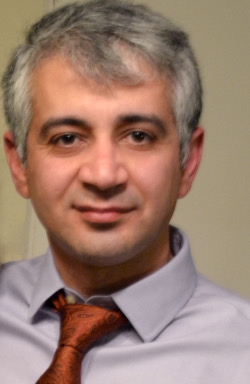
Mahmoud Ghaznavi obtained a BSc and a MSc both in physics from Isfahan University of Technology in Isfahan Iran and Sharif University of Technology in Tehran, Iran. After that, he came to Waterloo Canada and obtained a Master of Applied Mathematics in University of Waterloo. He obtained his PhD in Chemical Engineering from University of Waterloo, working on modeling and simulations of lithium sulfur battery and zinc hybrid hybrid aqueous battery. Then, he joined the lab of Prof. Roger Newman in University of Toronto to apply his knowledge of physics, electrochemistry and his skills in modeling and simulation of coupled multi physics systems to the field of corrosion. His journey in science gave him opportunity to grow outstanding skills to explore and understand the physics (and logic) behind phenomena to solve problems efficiently. His wide background and experience made him a versatile person who always love to stimulate his brain by learning new things and challenging his mind by engaging to solve exciting problems. He is currently working on improving library generation for DIA mass spectrometry and also, developing new methods to improve statistical analysis of DIA data.
Nicolas Grinberg
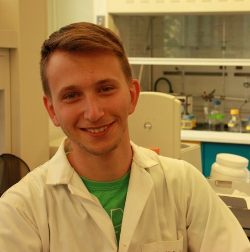
Nicolas completed his Honors BSc in Chemistry at McGill University in 2019. His research interests lie in how analytical techniques such as mass spectrometry and ion-mobility mass-spectrometry can be used alongside rigorous statistical treatment to identify novel drug targets. His favorite book is “The Periodic System” by Primo Levi.
Aparna Srinivasan
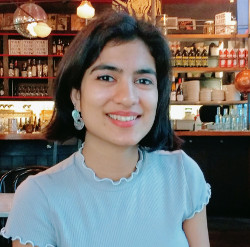
Aparna graduated with a BA in Biological Science and Mathematics from the University of Chicago. Her current research in the Rost and Gingras labs focuses on improving identification of phosphorylated proteins using ion mobility in order to enhance understanding of site specific phosphorylation functions.
Joshua Charkow

Joshua Charkow completed his BHSc in Life Sciences with a minor in computing at Queen's University. His research interests involve the development of mass spectrometry-based proteomic methods for use in understanding biological systems and personalized medicine. He is currently focusing on evaluating the separation power of ion mobility in mass spectrometry based proteomics. Outside of the lab, Joshua enjoys hockey, skiing and playing guitar.
Justin Sing

Justin completed his B.Tech specializing in Biotechnology at McMaster University. His research interests are directed towards methods development for personalized medicine and post-translation protein modifications. Justin believes- and aims to continuously contribute to open-source tool development to benefit the research community – most recently he has contributed to MatKit, an easy to use streamline image-processing framework. Outside of research, he occasionally reads books on philosophy and physics, and highly recommends 'The Order of Time by Carlo Rovelli'
– "To understand ourselves means to reflect on time. But to understand time we need to reflect on ourselves. - Carlo Rovelli".
Leon Xu

Leon Xu completed his Honours Bachelor of Science in Bioinformatics and Computer Science from the University of Toronto. His current research focuses on the development of machine learning/algorithmic methods and software tools for mass spectrometry based proteomics. His other scientific interests include cancer, aging, and personalized medicine.
Premy Shanthamoorthy
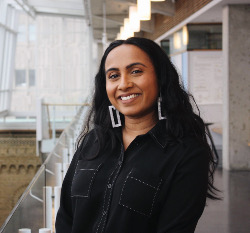
Premy Shanthamoorthy completed her BHSc Honours in Biomedical Discovery and Commercialization from McMaster University. Her current research interests include combining dating mining with experimental optimization to advance the field of personalized medicine and disease diagnostics. Her work in the lab focuses on a personalized metabolomics profiling approach using DIA mass spectrometry to yield insight into the molecular causes of an individual patient’s disease and associated risk over time. In her free time, she explores dance and is learning how to sew!
Adamo Young
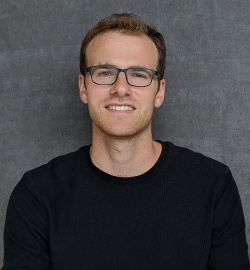
Adamo Young completed his HBSc in Computer Science at the University of Toronto. His research focuses on applying machine learning to a variety of problems in computational biology, in particular mass spectrometry for metabolomics. He is most interested in problems that involve learning with discrete structures, like graphs. He is currently working on improving methods for predicting mass spectra from metabolites, as well as developing new models to solve the inverse problem of predicting metabolite structure directly from mass spectra.
Shubham Gupta
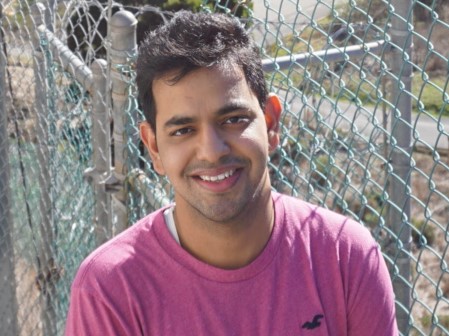
Shubham Gupta completed his B.Tech from IIT Roorkee, India and M.E.Sc from University of Western Ontario, Canada in Electrical Engineering. His current research involves developing computational methods for pushing mass-spectrometry-based proteomics for large-scale translational research (e.g. cancer). He is also interested in method development for personalized medicine and metabolomics.
Ron Blutrich

Ron completed his B.Sc Honours in Biology at the University of British Columbia. His research interests include mathematical modelling of biological systems and computational method development in mass-spectrometry based proteomics. Currently, Ron is being cosupervised by Hannes Röst and Ran Kafri and his research involves applying mass-spectrometry and statistical modelling approaches to investigate the relationship between cell size, organismal longevity, and the mTORC pathway.
Become a lab member
We currently have an open postdoctoral position in computational mass spectrometry. If you are interested, please read the job advert or contact me at hannes.rost [.at.] utoronto [.dot.] ca.
We are currently also hiring motivated undergraduate and graduate students as well as postdocs. If you are interested in joining the lab, please contact me at hannes.rost [.at.] utoronto [.dot.] ca, on Twitter, LinkedIn or drop by my office in the Donnelly Centre Room 604.
Alumni
Dr. Olga Zaslaver
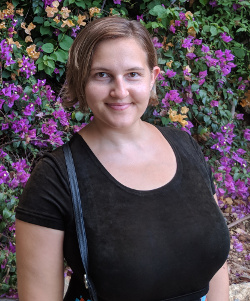
Olga Zaslaver obtained a BSc in Biomedical Science from York University in Toronto, and a PhD from the department of Molecular Genetics at the University of Toronto. Olga's PhD work investigated the origin of two poorly described metabolites in budding yeast, the oncometabolite 2-hydroxyglutarate and the fermentation product citramalate. She uncovered the enzymes responsible for 2-hydroxyglutarate metabolism and described its compartmentalization within cells using high resolution LC-MS, stable isotope tracing and genetics. She also connected the industrially relevant compound citramalate to leucine and threonine metabolism in yeast. Since 2016, Olga has been investigating the metabolic fingerprint of patient-derived glioblastoma stem cell lines through her work with Stand Up To Cancer. Olga continues to use high-throughput LC-MS technology to understand the dynamics and variation in cell metabolism and its implications for health and disease.
Emily Franklin

Emily completed her Bachelor of Science Honours in Biochemistry and Bachelor of Computer Science at the University of New Brunswick. Her research interests include bioinformatics with current work focusing on the development of mass spectrometry software tools that leverage machine learning.
Yujia (Charlotte) Cai

I am an undergraduate specialist in Molecular Genetics and major in Statistical Science at University of Toronto. I am interested in employing statistical and computational tools to analyze omics data for better understanding biological questions. My recent work in Röst lab focuses on developing novel statistical methods to detect proteoforms utilizing SEC-SWATH-MS data and further exploration of their interaction on complex level.
Max Frank

I am a visiting Master's student in Bioinformatics and joined the Röst lab in January 2018. I finished my undergraduate studies in Biology at ETH Zurich. My previous masters research took place in the laboratory of Ruedi Aebersold, focusing on the detection of protein-protein interactions using SEC-SWATH-MS. In my current work I am looking to contribute to the development of novel computational analysis techniques for mass-spectrometry based proteomics
Annie Ha

I am an undergraduate studying biological physics specialist and physiology minor at the University of Toronto. I am interested in studying cancer and neurological disease developments through computational biology. I use computer programs such as Python and R for studying biological mechanisms. During my spare time, I look at open source clinical data on cardiovascular research and neurophysiological research.